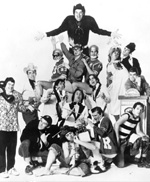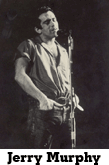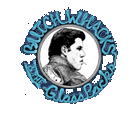|
IN
THE MID-80's when the Cave was torn down the Vancouver
Sun published a list of the top 25 acts that had
ever played at Western Canada's premier showroom
and the Glass Packs made the cut.
Meanwhile, how'd those bunny ears get in our wardrobe
case...
This history would not be complete without the
admission that we, the Glass Packs, were on Hugh
Hefner's payroll. Yes, we shared tight quarters
with the bunnies in the Mother Hutch - the Chicago
Playboy Club. For three weeks in January of 1975
we ducked and dodged (or at least some of us did) young women our age dressed
as rabbits carrying trays of cocktails, bunny-dipping
to the customers while balanced on stiletto heels.
Two shows a night six nights a week, we played
to the Glitterati of the Windy City. Quick show
of hands, who can still bunny dip? (BTW, we followed Henny Youngman -- how many rock bands can make that claim?)
 Meanwhile,
back in San Francisco (yes we also played at the
San Francisco Playboy Club), we played at what
in some of our humble opinions was the best San Francisco
club of them all - the long gone Boarding House.
The Boarding House is now the lobby of an apartment
building at 945 Bush Street, but in 1974 it was
an intimate wooden 250-seat playhouse with perfect
acoustics and Old World class. In a two-month
stretch preceding the Glass Packs debut, the following
new acts played the Boarding House- Steve Martin,
the Manhattan Transfer, Bette Midler, Bob Marley
& The Wailers, The Tubes. Meanwhile,
back in San Francisco (yes we also played at the
San Francisco Playboy Club), we played at what
in some of our humble opinions was the best San Francisco
club of them all - the long gone Boarding House.
The Boarding House is now the lobby of an apartment
building at 945 Bush Street, but in 1974 it was
an intimate wooden 250-seat playhouse with perfect
acoustics and Old World class. In a two-month
stretch preceding the Glass Packs debut, the following
new acts played the Boarding House- Steve Martin,
the Manhattan Transfer, Bette Midler, Bob Marley
& The Wailers, The Tubes.
We later headlined, but our first time at the
Boarding House we opened for Commander
Cody & His Lost Planet Airmen -
the nicest guys we met in all of our travels.
Lousy basketball players but nice guys; and oh
man could they play. In fact, they taught us how
to play like professionals. Glass Pack Gary Murphy
will tell you he learned to sing at the feet of
rockabilly madman Billy C. Farlow, lead singer
of Commander Cody and an unsung hero of rock &
roll. They were fans of our showmanship as were
devotees of their musicianship. One
night at the Boarding house we brought tears to
the eyes of the Lost Planet Airmen watching us
off stage as we silenced the foot stomping crowd
with an encore rendition of Graduation Day, an
odd, but effective choice that reversed expectations
and met them at the same time -- a soft, low volume
good night kiss. It was eerie to walk off stage
under the spell of such a powerful silence and
tell Commander Cody "Its all yours boys".
 In mid 1975, we finally got our record deal. When
we returned from our Fall trip to Vancouver, we
got to work writing a musical comedy album. The
subject matter was absolutely forbidden - the
Beatles. Nobody at that time covered the Beatles,
let alone parodied them; after all they were the
Fab Four and it was only four years after they
had broken up; and they were not to be made fun
of. Their songs were sacred texts and you just
don't kid around with serious art. That didn't
stop us, though as we started with the album jacket
- a huge apple with eight worms coring out the
center featuring each of our smiling faces.
In mid 1975, we finally got our record deal. When
we returned from our Fall trip to Vancouver, we
got to work writing a musical comedy album. The
subject matter was absolutely forbidden - the
Beatles. Nobody at that time covered the Beatles,
let alone parodied them; after all they were the
Fab Four and it was only four years after they
had broken up; and they were not to be made fun
of. Their songs were sacred texts and you just
don't kid around with serious art. That didn't
stop us, though as we started with the album jacket
- a huge apple with eight worms coring out the
center featuring each of our smiling faces.
The idea was to re-create the Ed Sullivan show,
and substitute the Glass Packs on the bill for
the four mopheads (with Bob Sarlatte's spooky
Ed Sullivan impersonation announcing that "Right
here on our stage . . . ladies and gentlemen a
big round of applause for . . . Jack Ruby";
followed by circus fire sound effects and "Timba
the elephants are coming" screaming); then
follow the Beatles career path with radically
different arrangements of the Liverpudlians' songs.
For example, the first track we cut was from the
early Beatles "Act Naturally" session
where the Fabs also cut some other country songs
that never made it to vinyl, like the original
"Ticket to Ride", sung by Bob Sarlatte
as Johnny Cash doing Folsom Prison Blues; i.e.,
a countrified version of Ticket to Ride with nasal
hillbilly background vocals -- "Ma biby dun't
keer, Ma biby dun't keer", the same guitar
licks, with a Tennessee Three rhythm feel and
the Big Fella's basso Johnny Cash voice.
Meanwhile, it is 1976, and the airwaves are alive
with the sound of disco. We on the West Coast
did not experience Disco music the way it was
meant to be experienced. A year before
Saturday Night Fever, the Glass Packs toured the
South, playing in Miami, Atlanta, Greenville South
Carolina . . . The Swinger Lounge on the strip
in North Miami Beach is part of the Marco Polo Hotel, virtually next door to the Fountainbleu. Our job was to
play two sets six nights a weeks for three weeks
-- one at 10:00 p.m. and one at 2:00 a.m. When we weren;t out on the intercoastal waterway getting sunburned, we shared
the stage in alternating sets with Cook E. Jar
& the Crumbs, Cook E. Jar being a fantastic,
but unheard of, white soul singer, along the lines
of Tommy James, Eddie Money and the Young Rascals.
His wife was quite the show-woman herself, making quite the glamorous entrance and bows when he introduced her at the end of his set.
The Swinger Lounge had a large seated area in
front of our stage and beside it a huge dance
floor. On the dance floor there appeared legions
of women from Montreal, Boston, Philly and the Big Apple, with white blouses (which appeared iridescent
under the ubiquitous black lights) and big hair
dancing in eight by eight rows, like a phalanx
of Persian warriors doing "the Hustle". A really fascinating
phenomenon, because these women had no interest
in dancing with men at all. They had figured a
way to avoid drunken guys who couldn't dance anyway
slobbering all over them - so they danced with
each other in complete lock step oblivious to
everything except the beat.
Disco was everywhere, and the trip to the South
and the East was our last. We didn't know that
when we left home, but by the time we finished
the two month our, it became apparent that greater
success still meant the road -- more of the Chicago
Playboy Club, more of Miami Beach, living out
of a suit cases, late hours, no home life - just
better hotels. The bottom line was that there
was no market for visual musical comedy act like
ours, as video and cable T.V, were more than 10
years away. So four years after college -- enough
time to become priest, a lawyer, a doctor -- we
decided that it was time for each of us to throw
his own pies in life. And Butch Whacks & the
Glass Packs was no more. And what's so good about
goodbye?
|

